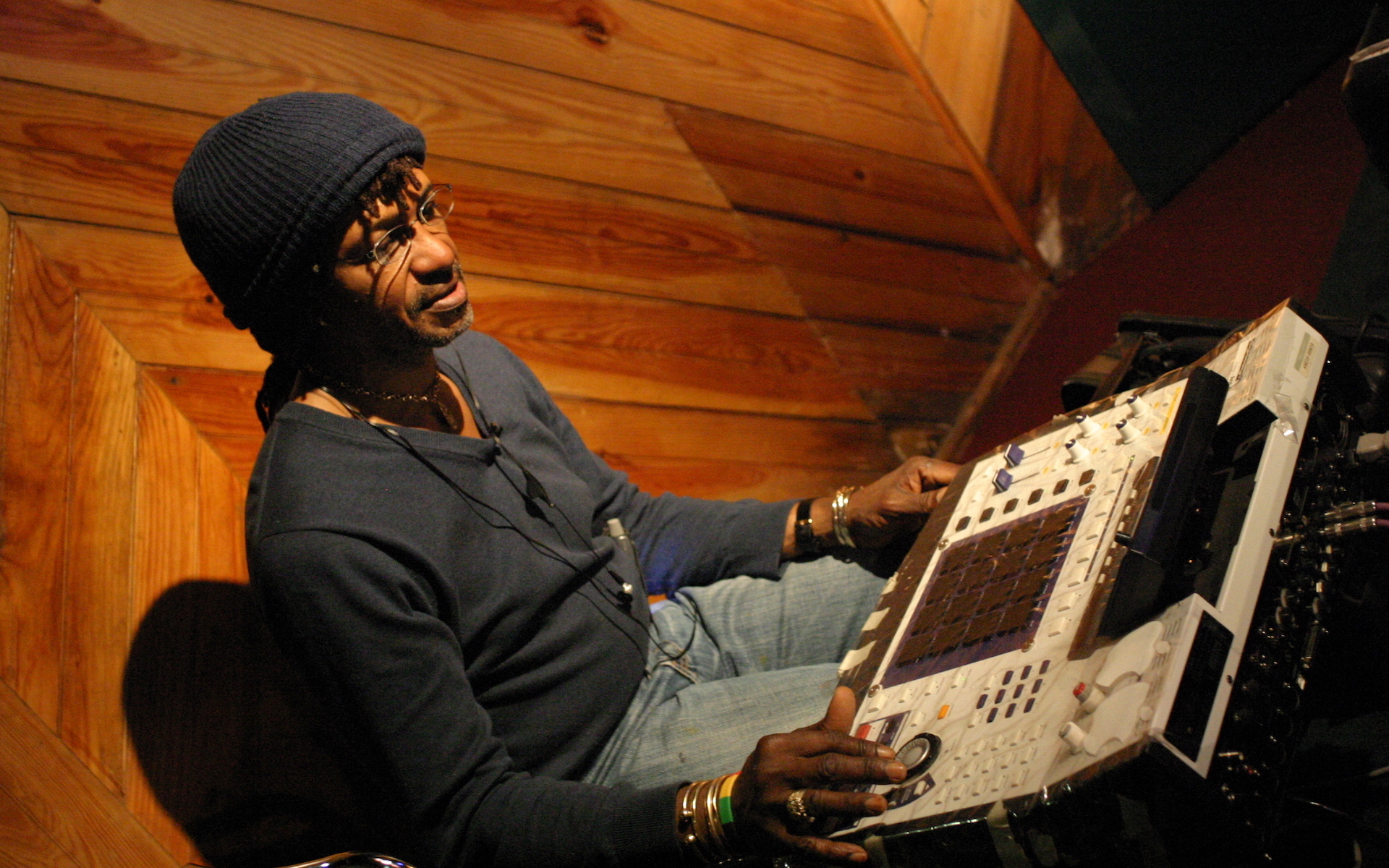Music is My Life: Episode 001
Glenn Kotche Talks Wilco, Solo Projects, and Soundtrack Work

Wilco Drummer Glenn Kotche on Jim O’Rourke, Jeff Tweedy, and Finding New Drum Sounds
On the first episode of this podcast from Berklee Online, Glenn Kotche, the man you know best as the drummer for Wilco, shares everything that happened in between the very first drum he destroyed—at the age of three—to his experimental solo work and how he got behind the kit, playing with Jeff Tweedy.
[Host Pat Healy]: Welcome to “Music is My Life”. A brand new podcast presented by Berklee Online. I’m your host Pat Healy. Thank you for joining as we follow the musical paths of our subjects from the very first time they made contact with their instruments of choice to their current status, which ordinarily involves music every day of their lives. Today’s subject: Glenn Kotche. You probably know him from his day job as Wilco’s drummer. He’s also a composer in his own right and we caught up with him before a recent solo show in Boston. So before Glenn Kotche walks you through his musical life, let’s review some statistics. In 2001, Kotche replaced Ken Coomer as Wilco’s drummer. Before that, he had worked with Wilco leader Jeff Tweedy and producer Jim O’Rourke in a project they called Loose Fur. Not Lucifer, but Loose Fur. Oh, I love a good pun.
Now, if you heard me say who Kotche plays drums for and you said to yourself, “harrumph, Wilco Schmilco,” you are either A, very rude and dismissive and you use outdated language to express that. Or B, you are quite aware that Wilco have a brand new album coming out on September 9th called Wilco Schmilco. It’s their tenth official studio album, and their seventh with Kotche behind the kit. But before he got involved in any of that Wilco schmilco business, Kotche studied music at the University of Kentucky and before that he was a member of the drumline in high school marching band in Roselle, Illinois. But Glenn Kotche music life began way before that.
I’ve identified myself as drummer since age three when I destroyed my first drum. And I started taking lessons when I was 10 years old. When I first started out, honestly, my first big influence besides the high school marching band that would practice by my house and march up and down the streets, Gene Krupa. My family would take vacations to a place in Wisconsin a lot and drive from Chicago. And there were these rest stops or truck stops that had old Gene Krupa cassettes. And so, he’s the “father of the drum solo.” He popularized in Sing Sing Sing with the Benny Goodman Orchestra the drum solo. … I listened to that a lot.But then of course from there, I have five older siblings so I was hearing a lot of Beatles, I was hearing Elton John, whatever was on the radio at that time. Glen Campbell. So a lot of different drummers that way and they quickly after that got into [Led Zeppelin drummer John] Bonham and Black Sabbath and more metal drummers. And throughout high school it was the ’80s so it was Neil Peart with Rush and Stewart Copeland, and then Living Colour and of course a whole world of jazz drummers in college. And after college a whole world of lesser known drummers.
Kotche says his time studying music at school opened his ears. And it also opened some doors. Earning a degree in music performance in percussion was essential to get him to where he is now, even if he may be the only member of Wilco who is able to read music.
So when I think back about my music education, and having been a product of school programs from an early age: Marching band, orchestra in junior high but also starting my first rock band when I was about 10. So I’ve always kind of been in rock bands, done that but I also have a degree in classical percussion and have always played in more academic settings as well. For me it’s been tremendously useful, especially for what I do now and I think it kind of dictated what I do now. My whole approach to drum set is dictated by all the different areas of percussion I learned. Because percussion, unlike most traditional instruments, is not an instrument. It’s a world of instruments and there’s so many different ways you can go and so many different styles that go with certain instruments. So many different things you study! You know, in college I was studying four-mallet classical marimba. I was studying orchestral and timpani parts for opera. I was also studying African drumming and steel drum band drumming . . . playing big band and jazz. You know, studying ragtime drumming, you name it. Multiple percussion 20th century literature . . . So all over the place! You learn all these things and that’s what informed my approach to drum set now. Because when I got out of college I was like, “well, let’s see. I’m not the best big band jazz drummer, but I love playing rock but I’m also . . . I know I don’t want to be in an orchestra anymore.” So I took all those areas that I studied and started using those techniques, those instruments, the concepts, that . . . it’s not just about rhythm and groove, which a lot of drum set playing is, but it’s also about timbre and texture and I can play mallet melodic percussion. I can play electronic percussion. I can do little flourishes and swells or I can just lay down grooves and bash, too. So there’s all things and when I start applying all those lessons and ideas and concepts and incorporating these instruments that I learned in these other areas of percussion to drum set, that’s when I started to get my own voice and that’s when I piqued the interest of Jim O’Rourke and Jeff and that’s pretty much why I was asked to join Wilco because Wilco at that point was going in a different direction, leading up to recording Yankee Hotel Foxtrot. And I was doing a lot of free improvising, using guitar effects and contact mics and playing no rhythm at all, and it seemed like that right kind of sound world that was appropriate, for that record at least. So for me that’s been incredibly useful and I always encourage when I teach and when I did teach a lot, I always encouraged students to learn how to read, because for me it’s just a tremendous tool.
“I don’t think by studying, by learning things, or having teachers that you’re necessarily going to be a carbon copy of what you’ve learned.”
If I hear a groove, I can picture it and if you ask me 10 minutes later, I can play it, where I know some people who can’t do that. They have to listen to it right away and play it at the same time. I just think it’s been a great tool for me and also now that a lot of what I do is composing for chamber groups, orchestra, percussion ensembles, things like that, so obviously it’s key in that as well. It’s not that crucial to a lot of people. I know many amazing musicians, incredibly creative artists and just guys who have mastery over their instruments who don’t read at all and never studied and are self taught. And that’s great too because they a lot of times have a certain type of musical personality that is truly original. That is their own voice. But like I said, I’m very studied and I feel like I’ve gotten to that point from a different channel as well so I don’t think by studying, by learning things, or having teachers that you’re necessarily going to be a carbon copy of what you’ve learned. I think those are just more tools to find out who you are. Both methods work. I just encourage people, especially younger people now because I see the reality I work with. A lot young percussionists, a lot of young musicians and the reality of the world, it’s just if you have those skills you’re going to be more marketable, you’re going to have more opportunities that you can accept and that you can fulfill and knock out of the park. So, it’s been great for me but, yeah. I cherish my background in education boat. It’s not for everyone. I understand that.
Kotche says what he looks for in a collaborator isn’t even necessarily musical virtuosity.
When it comes to collaborators I think I look mostly for creativity, I guess. A curiosity, a hunger to keep growing and creative . . . It doesn’t matter if they’re great on their instrument, but if they’re coming up with interesting ideas, those are the people I want to play with or write for. I think that’s the most key element because I’ve seen plenty of shredders and I know that that’s an amazing thing. I love that. I watch it. I indulge sometimes myself, but it’s that doing something that’s not been done before, that’s what excites me and that’s what excites me about literature, about art, visual art, about theater, about dance! . . . It’s more like, “how did they think about food? Chefs, how did you come up with this thing when people have been doing this dish for 300 years and all the sudden you found a new way to do it?” It’s the same way with music for me. It’s like, that’s what I geek out on so I think I’m more of a creative nut than I am even a music nut. And those are the people I try and seek out professionally.
One of the first drummers that Kotche encountered professionally after college was Maureen Tucker of the Velvet Underground and you’re not likely to find a better example of an instrumentalist known less for virtuosity than for, well, simplicity. Brilliant simplicity, really.
I was lucky enough right after I finished college to play in a record produced by Maureen Tucker from the Velvet Underground and got to double drum with her and it was a perfect experience for putting all of this stuff I learned in college in perspective because she is someone who is completely unschooled but yet plays kind of not- perfect on all those Velvet Underground recordings. Sometimes it’s drums. Sometimes she’s just playing a tambourine on two and four and so that was a great lesson to . . . keep it all in check. Think about the music and the big picture first, not just about what you can add.
So my influences have constantly fluctuated and if I told you them, this would be 15 minutes of me spouting off names. And, a lot of non drummer and non musical influences as well . . . ideas people . . . A lot of visual art really influences what I try to imitate. How do they do that and how would I apply that to what I do? So it’s just a lot of asking that question when I see something really cool, finding out how they made that leap and then applying that to what I do somehow.
Kotche does indeed apply several leaps to his drumming. One look at his kit and you might fight a radiator, some hubcaps, faucets, some spindly looking thing that I could figure out what it was and I had to ask him about.
That’s a fruit basket.
Okay.
It was a wedding present.
Was it really?
Yeah. It sounds like shit unless you hang it from a rubber band over a contact mic but . . . the cool thing about percussion is it does encapsulate everything that’s not a woodwind, a brass, or string instrument or voice, right? So you have those very defined things and percussion is everything else, at least in my definition of it. Traditionally in the orchestra, that’s what it was when they were like, “Okay, this composer wrote for canons. This one wrote for church bells. This one wrote for starter pistol or wind machines. Who’s going to play it? Get into the percussion section.”
And people like John Cage completely liberated percussion as well because now it was just as much about exploring musical ideas that weren’t based on harmony and melody. And so he incorporated break drums and tin cans and this is almost well, yeah, 80 years ago so pretty groundbreaking stuff. And since then I think drummers are kind of used to like, “oh yeah, these are things we have in the percussion studio at any conservatory or college,” and that anything is viable as an instrument and so, I’m so ridiculous and bad about it. My wife has an incredible tolerance, but I can kind of look at something now and know. I know materials enough to know what kind of sound it’s going to produce but yeah, it’s incessant my whole life, tapping on things, checking out the sound, what it is. So I’ve explored a lot of things like that.
There’s “I’m Trying to Break Your Heart” by Wilco, I use on that tune alone an old metal hubcap with a contact mic on it as well that’s run through a little overdriven amp to get a different sound. I use ceramic tiles that I play with rubber mallets with marimba mallets. I use drink mixers on the insides of piano and sometimes I tie fishing line and put little washers so gets . . . it’s a very fast moving mallet. It’s a nice collage.
Yeah.
And that’s [Yankee Hotel Foxtrot producer] Jim O’Rourke, who mixed that song. He brought out all the elements and made it, because it’s three chords! And it’s like seven minutes or whatever. He made all these scene changes that gave it a narrative til you get to that end. There’s a lot of cool sounds on that but also with my own music as well like on my kit that I’m playing tonight. I have a fruit basket that was a wedding present that actually doesn’t sound that great but because I incorporate contact mics a lot, you get these small sounds that can compete with big sounds and sometimes you bring out aspects of the sound personality that otherwise get lost if you’re just listening with your ears. So this fruit basket sounds bad, but if you want to suspend it from a rubber band so it can ring, put that over the contact mic you get this fundamental low sound that’s incredible.
Same thing with my prepared snare, which is just a riff on John Cage’s “Prepared Piano.” I’ve got springs, large springs that I scrape with my fingernails. Small springs that I swipe. I’ve got fishing line wrapped around little sticks with violin bow rosin that gets a creaking noise. There’s a play on a cuíca. There’s a stick coming through and lions roar. These little wires if you put beeswax on them you get the friction and so the drum’s a resonator too: Not just something that you strike. So those little sounds then can compete with the big sounds. And so by using effects pedals that guitarists always do but drummers can, too. And using contact mics you even explode that sound world more. Tonight I use an air raid siren. I use little Buddha balls, I use bird calls besides normal percussion and classical percussion. The crotales, the glockenspiel, drum cymbals, yeah, so, almglocken, Swiss cowbells, cricket boxes. What else do I have up there tonight? Yeah, little shakers from bottle caps and all sorts of fun stuff but yeah.
I think all percussionists now—especially classically trained ones—are required to explore different sound worlds for a lot of the literature they have to play. And also any drummer who’s recorded in the studio, I have a lot of variations on sticks and mallets that I tape coins on, or tape up, or put towels over just to get different sounds because under a close microphone you can get a really compelling sound that maybe if you just used the stick or just used the brush or rod you wouldn’t get.
When Kotche joined Wilco, they were in the process of birthing their fourth album and experiencing some labor pains, frankly. The album was a departure from everything they’d done before. They began as kind of an alt country group, then went into more of a synthy rock sound with their third album, Summer Teeth. So I asked Kotche if it was difficult to come into this role as the new drummer when the style of his predecessor was so different from his own.
Well, it’s interesting joining a band that already had a few records out at that point and history with a drummer that I really respect and enjoy his playing a lot. I kind of took the attitude of, with Wilco at least, “if it’s not broken, don’t fix it.” And knowing those songs, I was attached to some of those parts already. So I basically tried to keep those parts intact, however, I think anyone playing someone else’s music, you naturally interpret it through your own background, your own history.
So, I think some of those parts sound like me even if I’m playing what Ken did or in a couple isolated instances where Jay [Bennett, former Wilco instrumentalist] did. And over time, like any songs, even ones I’ve recorded, live they tend to mutate over a period of time and there’s sounds that we’ve played hundreds of times that right now there’s a way that we know the song, but it’s not really what it was at the record. Fills are different. Things that we do are different. Tempos are different … energy. There’s a lot of things that can morph over time and you find something that works and then it’s like oh, you get locked into that and keep doing it over and over. So, that’s happened naturally even with the songs that I originally recorded. Or course it’s happened with the songs I didn’t record. So, I guess the core of those parts is still there but it’s filtered through my personality and more than that, through time.
So how does a drummer who is so experimental and so interested in finding new percussive sounds to incorporate into his music . . . How does somebody like that fit into a rock band? How does he stay satisfied just playing a straight up four-on-the-floor beat.
Everything in life is about balance. Work, family, being in a rock band, or being a solitary composer performing experimental off-the-wall music or just laying down a groove. I kind of need all of that in my life to be happy and I enjoy just as much as exploring all those sounds and coming up with new pieces that they fit into, just laying down a deep groove . . . because a lot of those most successful drum set players and studio drummers throughout history are the guys who don’t add a bunch of stuff, don’t throw a bunch of notes, and they’re not trying to always show you what they can do and display their facility on the instrument. Instead, they’re just . . . you always hear that term serving the song. Well, serving the song is complex. I’m not going to go off on a tangent of that because a lot of times you want to take a song to a place that can elevate it and take it to a different place that what you’d expect to hear.
But, as far as just playing simple, I get off on that. Not just by the feel and how good it feels to play it but also playing some songs that I just do a back beat super basic with Wilco that I’ll play a few hundred times over the course of years. I just zone in on the minutia of it. So for me that could be like, “okay, instead of playing the high hat up and down like this, what if I play German instead of French. Or what if I swing it?” And when I swing it, it sounds a little different. It feels different if I put the pressure of the fulcrum up here, if I loosen my fulcrum, and squeeze from my back fingers and I get more of the weight of my arm and then . . . but how much tip and how much neck am I using on the high hat?
And there’s a thousand parameters of what makes this sound and what makes this feel a certain way just on that one limb, besides what’s happening on [this song] besides on your bass drum and my bearing, playing out, heel up, heel down, the snare drum, what kind of technique? Where am I hitting it? . . . Am I lifting from the back of the stick or the front of the stick? So many things that I can zone in on and just explore that way, too while I’m “serving the song” and staying out to the way of the lyrics or trying to help illustrate the lyrics or just providing the anchors, which some songs, that’s all you need . . . is a drummer. That’s … I guess just a different type of exploration but that makes it very easy for me to not mess that up and just see what’s going into this to make it right.
When he’s not busy serving the song for Wilco, Kotche works on solo projects. He’s released four albums under his own name. While he says he doesn’t actively engage in any marketing for the music, he lets the music do its own marketing.
I mean, the only thing I would have to say about any sort of marketing anyway would be that I don’t really know anything about it. What’s always worked for me is doing what I’ve found interesting and honestly my solo records are not money-makers for me. Not directly, not by royalties, but they’ve almost acted as a sort of acted like a business card. And when I released Mobile on Nonesuch back in 2006, after I released that, I got commissioned by Chronos Quartet and by Silk Road Ensemble and by Bang on a Can and Eighth Blackbird, and Sō Percussion. And so because of that, I had all this other work and that’s kind of why I document a lot of my music through recordings is because that’s kind of my avenue for marketing. Yeah. That’s my business card: Making music and letting people hear it and if they like it, maybe it leads to other things or other collaborations.
Kotche’s parting words of advice: Keep practicing. Keep doing what you’re doing. Keep doing what you enjoy. Keep being you. Keep learning because you never know when your chance is going to come.
Everyone usually has some sort of chance. You just gotta be ready when it is. It might be tomorrow, it might be in 20 years but that’s what happened for me at least. I was something at the right time and the right person saw it and that led to this or that or … You know, it happened a couple times and then all took off from there.
May it all some day take off from there for you. Thank you very much for listening. This has been Music is My Life.





